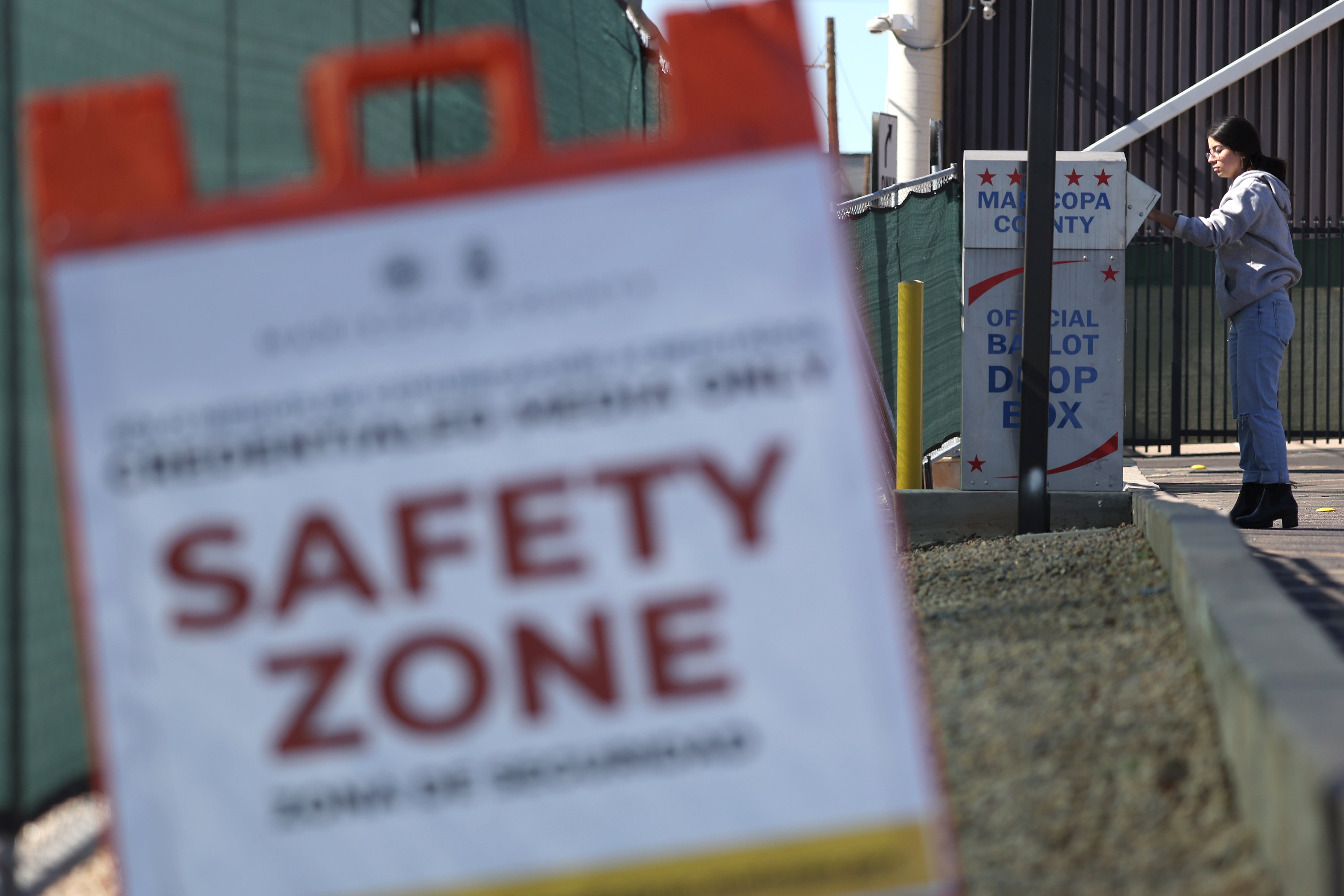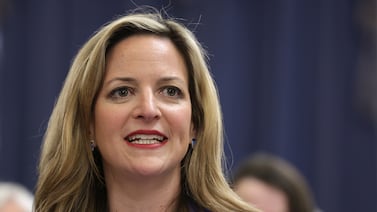Votebeat is a nonprofit news organization reporting on voting access and election administration across the U.S. Sign up for our free newsletters here.
Arizona voters have long relied on unstaffed ballot drop boxes to conveniently cast their ballots, but challenges to their use persist and a new state rulebook does little to clarify their legal status.
Secretary of State Adrian Fontes’ new Elections Procedures Manual, finalized Dec. 30, lays out the rules for high-profile aspects of the state’s elections, such as hand-counting ballots, delaying the certification of an election, and voter intimidation. But the new edition does less — not more — to assert the unstaffed drop boxes’ legality.
Ballot drop boxes are increasingly popular across the state, but since unproven claims of ballot harvesting at drop boxes began spreading in 2020, Republican lawmakers in Arizona have proposed either eliminating them altogether or enacting new laws aiming to make them more secure, such as requiring them to be staffed when open.
The prior manual, written by Gov. Katie Hobbs in 2019 when she was secretary of state, said that an “unstaffed drop box may be placed outdoors,” and “an unstaffed drop-box placed inside a building shall be secured.” The new manual changes those passages to say, “A drop box established and staffed by election officials may be placed outdoors” and “a drop-box established and staffed by election officials that is placed inside a building shall be secured.” A few other lines in that section imply that not all drop boxes will be staffed, but the manual no longer explicitly states that unstaffed drop boxes are allowed.
Hobbs’ general counsel says the language changes were designed to mirror the wording in state law, and that unstaffed drop boxes are still permitted. At least one local election official, though, was initially concerned with the changes, and Republicans say they intend to raise the matter in litigation.
“When I read that, it’s like, holy cow,” Coconino County Recorder Patty Hansen said Wednesday, adding that drop boxes are extremely popular in the northern Arizona county, which includes Flagstaff, and getting rid of unstaffed drop boxes would mean a drastic change for voters. Only two of the county’s 15 drop boxes are staffed, and 36% of voters used drop boxes to cast their ballots in 2022, she said.
On Thursday morning, after Votebeat had flagged the issue with several county recorders, recorders raised questions about the edits to the drop box language on a regularly scheduled call with the state’s elections director, Colleen Connor. Connor told them that state law and the manual allow recorders to use unstaffed drop boxes, as long as they follow the rules for securing them, according to Secretary of State’s Office spokesperson JP Martin.
“The recorders are on the same page,” Martin said.
After the meeting, Hansen said she was reassured by Connor’s comments, and the county will continue to use unstaffed drop boxes.
But at a time when every aspect of election administration is under heavy scrutiny, precise wording matters. The new language in the manual is already being parsed by those who believe unstaffed drop boxes are illegal, including the conservative Arizona Free Enterprise Club, which has a pending lawsuit in Yavapai County Superior Court on the matter.
Shown the edits, Tim LaSota, attorney for the Arizona Free Enterprise Club, said the changes to the manual “essentially concede the correctness of our arguments,” and the club plans to notify the court of the changes.
“We’re going to continue working hard to ensure that government officials like Adrian Fontes and Katie Hobbs follow the clear commands of Arizona election law,” LaSota said.
The definition of “staffed”
In Arizona, state law dictates how elections are run, and the giant Elections Procedures Manual, at 385 pages, doesn’t just instruct county officials how they must comply with state statute — it has the force of law.
The manual was updated Dec. 30 for the first time in four years, when Hobbs and Attorney General Kris Mayes, both Democrats, signed off on a draft Fontes had been working on for nearly a year, with input from counties and the public. Hobbs and Mayes requested many edits to the manual before signing off, including those in the section on drop boxes.
State law doesn’t say much about drop boxes. It says that all ballots must be delivered to the county recorder but doesn’t specify how. Another section makes it illegal to create a ballot drop-off site other than those “established and staffed by election officials.”
Some, such as the Arizona Free Enterprise Club, read that language as mandating that drop boxes be continuously monitored.
But the governor’s office has a different opinion. Unstaffed drop boxes have been in use since at least 2008. Neither election officials nor any court have ever interpreted that language to mean that continuous monitoring is required, said Bo Dul, the governor’s general counsel.
The word “staffed,” in that line, Dul said, does not mean continuously monitored. Instead, she said, it means that the drop box is operated by election officials under all of the protocols required by state law, such as security measures.
Dul said during the governor office’s review of Fontes’ draft manual, the change was made to remove the word unstaffed “to avoid further confusion or allegation that the EPM somehow conflicts with” the statute.
LaSota said the governor office’s definition of the word staffed is “ridiculous,” adding, “staffed means staffed.”
“A tollbooth is ‘staffed’ when someone is there to take your money,” he said, going on to quote the prior elections manual. “Just look at Katie Hobbs’ own definition from 2019: ‘within the view and monitoring of an employee or designee of the County Recorder.’”
Merissa Hamilton, a conservative elections activist that has been following the manual’s edits, said the governor’s office has “perverted” the meaning of the word “staffed.”
“I don’t think the general public is going to agree with their definition of staffed,” she said.
State argued EPM could establish unstaffed drop boxes
During a Dec. 14 hearing in the Arizona Free Enterprise Club case, Yavapai County Judge John Napper called the law on drop boxes “clearly muddled.” The state Legislature has allowed the secretary, governor, and attorney general to create the manual to “fill in the gaps,” he said.
“And that seems to be right where this case lands,” he said, adding, “this seems to be in this gray area.” Napper is currently weighing an October motion from the Secretary of State’s Office to dismiss the lawsuit.
Napper’s thoughts were in line with what the office asserted in its court filing, when it wrote that state law “supports the secretary’s authority to establish unstaffed drop boxes.”
The manual’s language allowing for the unstaffed drop boxes, then, would seem to be crucial to that case.
Asked why Fontes wasn’t more clear on unstaffed drop boxes in the new manual, Aaron Thacker, his communications director, said the secretary of state “is not going to micromanage election officials.”
“Rather the Counties and municipalities shall ‘implement procedures to ensure the security of the drop-off locations,’” Thacker wrote in an email, quoting the manual.
Thacker said a drop box does not always have to be monitored, citing a line in the manual that implies as much when it explains security measures required for drop boxes that are “not within the sight of election officials at all times the ballot drop-boxes are accessible to the public.”
Republican legislative leaders intend to sue Fontes over other portions of the manual, including his interpretation of when counties must start removing inactive voters from the state’s early voting list under a new state law. The Senate intends to file the lawsuit by the end of the month, according to a state Senate spokesperson.
In the call with recorders Thursday, Fontes said that he expects uncertainty around any of the language in the manual to be dealt with in litigation.
Jen Fifield is a reporter for Votebeat based in Arizona. Contact Jen at jfifield@votebeat.org.





